Academic program cuts unknown
By Sophia Tiedge sophia.tiedge@marquette.edu
It’s been almost a year since Marquette first announced it would be looking to terminate or modify 15 academic programs.
However, the university hasn’t released a list of those programs to the Marquette Wire. When the 15 programs were mentioned at a University Academic Senate meeting in January 2024, the Wire requested a list but was told that the process was ongoing and the programs were identified due to low enrollment. The Wire asked
for the list a second time last week and was told only the Medical Laboratory Science Program has been officially terminated. What information is known right now?
In September 2024, the university said it did not want to make the full list public to prevent affected faculty from finding out through a university document;
but rather wanted deans to be in charge of relaying the information. It’s unclear to what extent faculty and students are aware of possible terminations. The Wire is also aware that the German and classics programs were suggested for termination, based on communication with Sarah Gendron, chair of the department of languages,
literatures and cultures. Both programs opposed termination and stated their cases to the University Board of Undergraduate Studies last semester but haven’t heard anything since. University spokesperson Kevin Conway said each program up for termination will have a teach-out plan
Democrats propose campus gun prohibition
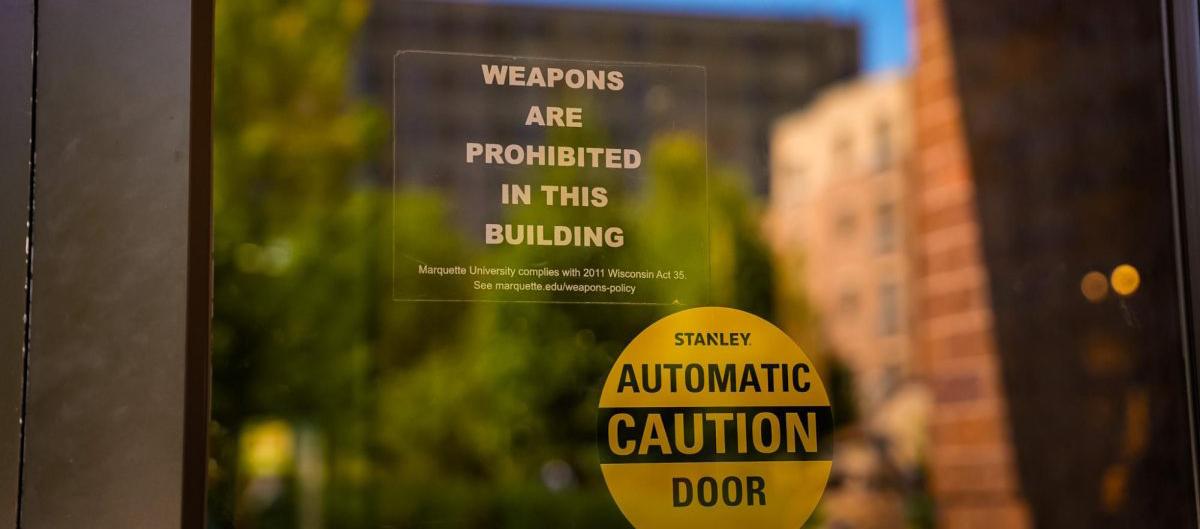
By
Wisconsin Democrats have proposed legislation to prohibit firearms on college and university campuses in the state. Sen. Kelda Roys, D-Madison, and Rep. Brienne Brown, D-Whitewater, introduced the legislation at an Aug. 27 press conference.
Class A misdemeanor to have a gun on university property — even for those with a permit — with a penalty of up to nine months in jail and a fine of up to $10,000. Roys told the Marquette Wire she was previously unaware of the different regulations on college campuses. She said all students should have the freedom to learn at school without the fear of gun violence.
like Indiana, Iowa and Minnesota, the decision is up to the institutions. In Illinois, Michigan and Ohio, campus carry is prohibited.
ensure security.
The Wire reached out to the Marquette University Police Department for further details and is awaiting a response.
of firearms from a person believed to be dangerous.
“This legislation aims to change that and bring Wisconsin into line with the other states who recognize that our colleges and universities are places for learning, for the free exchange of ideas, for deepening your knowledge and advancing your careers, and not for weapons,” Roys told the Wire.
Universities don’t have the capacity to take care of firearm regulations by themselves, Brown said. She hopes Wisconsin Democrats and Republicans can work together to pass legislation that protects college students from gun violence.
As of 2024, 21 states and the District of Columbia have some form of red flag laws in place, including Midwestern states Illinois, Indiana, Michigan and Minnesota.
Current law allows individuals with licenses to conceal carry in public or private university buildings. Under the proposed legislation, college campuses in Wisconsin would become gun-free zones, like K-12 campuses. It would be a
Currently, colleges and universities in Wisconsin can post signs banning guns from specific buildings, but there is no law to prohibit firearms campus-wide.
Marquette University has signs posted on campus buildings like academic offices and residence halls.
Wisconsin is one of 11 states that allow conceal carry on public college campuses. In surrounding Midwest states

Marquette maintains a no weapons allowed policy, but the university cannot restrict the licensed possession of weapons in outdoor areas, student apartments, buildings leased from the university or parking lots and structures. However, Marquette can restrict the way weapons are carried and stored in these areas to
The Wire reached out to State Assembly Speaker Robin Vos, R-Wis., for comment about changes to state legislation and did not receive a response. Stricter laws could prevent firearm deaths
In addition to increased college campus safety measures, Roys said, Wisconsin needs a red flag law. This law permits a state court to order the temporary seizure
“States that pass responsible gun safety regulation see an absolute decrease in firearm injury and death,” Roys told the Wire. “These measures work, just like safety measures across any other public health problem.”
According to the Johns Hopkins University School of Public Health, data shows that the states with the highest gun death rates tend to be in the South or Mountain West, which have weaker gun laws and more gun ownership. The
Mia Thurow and Maeve Heeney mia.thurow@marquette.edu maeve.heeney@marquette.edu See FIREARMS on page 3
What to expect from this year's student leaders
MUSG President, Vice President share initiatives
By Lance Schulteis lance.schulteis@marquette.edu
Settled into their Alumni Memorial Union offices for the year, Marquette University Student Government President Julianne Browne and Executive Vice President Adam Brzezinski are ready to hit the ground running.
Browne, a sixth-year senior in the College of Arts & Sciences, and Brzezinski, a senior in the College of Communication, outline their goal for Marquette in three words: “High School Musical.” In search of connection on campus, their dream is to see Marquette’s relationships model that of the Disney movie’s East High.
In wanting large groups of friends at a basketball school, the film became an easy mock-up for Browne and Brzezinski to describe their narrative and mission over the summer.
“We don’t just want the high energy and the pride at Fiserv Forum. We want it to be seen in the green spaces and our buildings. We want to be able to [walk] down the street and say hello to a stranger,” Browne said.
“We’ve been brainstorming and thinking of ways to bring us back to interacting together face-to-face, getting that human connection back on campus.”
So, what does that connection look like?
MUSG staff began the year helping students move in, carrying belongings to dorm rooms and meeting the new wave of Golden Eagles. Browne and Brzezinski hope that future move in days will involve as many upper-level students as possible, including those outside of MUSG, to create a schoolwide tradition.
“We got to learn about them [and] they got to learn about us and what we do,” Brzezinski said. “I remember as an incoming freshman or even a sophomore, you have your little cliques, but it’s very rare that you really connect with the upperclassmen.”
MUSG also set up lawn games across Eckstein
Common near the AMU and bonded with students over games of bags and spikeball.
There are still a few other items on their to-do list, including the six pillars they proposed during their campaign last spring.
Student Organization Funding
Student Organization Funding is designed to fund university clubs and activities, but according to Brzezinski, the process is not as known among some campus organizations. SOF is accrued through tuition each year, which includes a student organization fee.
MUSG will host training sessions in early September for student organizations to walk through the process of using SOF, from requests to reimbursement.
“A big thing that we’ve been striving for is to make the clubs more aware of what they’re capable of,” Brzezinski said. “We have this money. We want to give it back to the clubs and the students because it’s coming from them in the first place.”
MUSG hopes that trainings and educational measures for SOF will enable clubs to put on bigger events to serve the student body.
AEDs across campus
AED installation is part of a personal project for Browne. Last semester, she started the Emergency Preparedness Club, which promotes training for health emergencies, public outreach and fundraising.
In cases of cardiac arrest, survival chances drop from 7-10% for each minute a normal heartbeat isn’t restored. In Browne’s vision, colleges would increase AED accessibility by purchasing them for academic buildings while the club will cover maintenance costs, such as the replacement of expired batteries and pads.
While the university has not signed off that relationship yet, Browne will look to resume the discussions in the weeks to come.
Reworking course textbooks
To remove the added expense of textbooks for students, Browne and Brzezinski hope to introduce more open resources to Marquette’s library database. The university would subscribe to online text-

book platforms and the cost would be included in student tuition. The library has put in a grant application to buy open resources, though approval of a new collection of materials would require adjustments to course curriculums throughout the university. Because usable textbooks would be limited to the online platform, some professors would have to adjust their required materials.
Reinstating the Good Tenant Program
Browne and Brzezinski also hope to revive the Good Tenant Program, which assisted juniors and seniors applying for campus-owned apartments. The university would advocate for students as good renters, vouching for their ability to pay rent on time and respect the property.
Marquette also has a grievance resolution process to manage off-campus relationships between landlords and tenants.
Browne and Brzezinski have met with Mary Janz, Director of the Office of
Residence Life, to discuss a new version of the program, which would extend to off-campus apartments. The perfect arrangement, according to Browne, would also allow landlords to be held accountable for maintenance and rent management, though talks to reinstate the program are still in the preliminary stage with General Counsel.
Accessible groceries
With the exception of Sendik’s, Marquette is in a food desert with limited access to groceries. Initially, there was a proposal to expand Eagle Express vans to take students to grocery stores, though the idea was shut down by the Marquette University Police Department because it would require a larger service range.
An alternative option would be the creation of an app to help students carpool for grocery trips, though it currently sits in the idea stage.
Reimagined prayer spaces
Following a student push to reimagine prayer spaces for the Muslim community, Browne and Brzezinski are looking to put those
Valley Fields pavilion damaged by
Both
soccer teams without access to locker rooms
By Jack Albright jack.albright@marquette.edu
The historic 1,000-year flooding that decimated parts of Milwaukee in early
August — dropping over one foot of rain, submerging cars on streets and flooding basements — also damaged part of Marquette’s campus. Specifically, Valley Fields. Located next to the river in the Menomonee River Valley, the home of the university’s soccer, lacrosse and
track & field programs received enough rain to damage and shut down the complex’s pavilion building. In it are dressing rooms for both soccer programs, an officials’ and coaches’ locker room, a training room and spectator restrooms. In the meantime, all teams
plans into action. Brzezinski said the priority is creating places that are safe and fit for practice, with the added possibility of a space that can meet the needs of all faiths.
While that project has been internal among students, MUSG will take those discussions to school administrators to determine the best course of action.
A ripple effect of change Browne and Brzezinski will be the first to admit that they may not reach all of their goals during their time in the MUSG office. They’ll also be the first to admit that none of them may be fully finalized within those seven months.
Instead, the two want to build a Marquette community with shared goals.
Wanting to be the first dominos in the ripple of change, they hope that future students will continue their efforts long after they leave.
“We want the flame to be ever-burning,” Browne said, “If we can get a little snowball going and push it down a hill where it’s getting momentum, that’s our goal.”
flooding
have used the locker rooms under the main grandstand, a Marquette athletics spokesperson confirmed in an email, adding the pavilion will “more than likely be closed through the soccer seasons, but we aren’t sure yet.” It’s unclear if anything else
was damaged, how long renovation will take or how much it will cost. The Wire is working on scheduling interviews with university employees to learn more. Built in 2011, the Klein Family/KBS Soccer Pavilion had a total budgeted cost of $1.2 million.
FIREARMS: Bill faces battle in WI
Continued from page 1
Sahil Gupta, Elena Metinidis, Maeve Heeney, Mina Marsolek-Bonnet, Jaylen Hill
ARTS & ENTERTAINMENT
Executive Arts & Entertainment Editor MaryKate Stepchuk
Assistant Editor Katie Mancini
Reporters Elise Emery, Joseph Schamber, Allison Scherquist OPINIONS Executive
SPORTS
Photo
HAVE A TIP FOR US?
Have you seen something that you think should be a story? Do you have a tip about something we should be looking into? Do you have documents or other materials that we should see? We want to hear from you.
If you have documents you'd like to send us, you can send anything to wiretips@marquette.edu.

school cites death rates as being lower in Northeastern states with stronger gun violence prevention laws. 772 people died from firearms in Wisconsin in 2023.
Elliot Sgrignuoli, senior in the College of Arts & Sciences and president of Marquette University College Republicans, said he thinks changing firearm legislation won’t provide increased safety for residents, staff and faculty.
Sgrignuoli believes the greatest way to provide protection on college campuses is to invest in stronger surveillance and security systems, as well as walk through active shooter drills.
Legislation faces an uphill battle in Wisconsin Republicans, who hold a majority in the Wisconsin Assembly and Senate, are unlikely to advance the proposed legislation and have not signed on to other proposals introduced by Democrats in this session.
These four proposals include:
- requiring a waiting period to purchase guns
- outlawing undetectable firearms
- requiring gun owners who have children to safely store their firearms
- prohibiting the sale of firearms without a background check and federally licensed dealership.
Wisconsin Republicans
have also introduced a bill that would create a sales tax exemption for gun safes and another bill that would allow teachers to carry guns in classrooms to combat school shootings.
As of Aug. 27, there were no Republican co-sponsors on any of the Democrats’ proposed legislation to address gun safety in Wisconsin, according to a news release from Roys and Brown.
Proposal coincides with Annunciation Church shooting
When Roys was preparing remarks for the press conference about the proposed legislation Aug. 27, she received word of a shooting at Annunciation Church in Minneapolis. Two children died and 18 others were injured during a start-of-theschool-year Mass.
“That’s just an ordinary day in America. No other country on earth allows this level of preventable gun violence,” Roys told the Wire. Brown, who was visibly emotional during the press conference, said for decades the country has witnessed children dying at the hands of armed shooters while adults do nothing about it or weaken laws that were already in place.
Roys said fear for her children’s safety shouldn’t be at the top of her mind during back-to-school time.
“Gun safety measures like this are not controversial,” Roys told the Wire.

Posting on X (formerly Twitter), U.S. Rep. Derrick Van Orden, R-Wis., called the Minneapolis shooting “horrific news” and said he was praying for the students, faculty and their families. Mental health, suicide are factors in gun deaths
Firearm legislation doesn’t just prevent mass shootings, Roys said. According to data from the Pew Research Center, 58% of all gun deaths from 2023 were suicides. More than half of all suicides in the same year involved a gun. Over the past two decades, roughly 70% of gun deaths across Wisconsin were suicides.
Roys said college students are particularly vulnerable to mental health crises, facing social and academic stress while living in a foreign environment. She said the difference between life and death can be whether a gun is present or not.
On May 19, two
University of Wisconsin-Platteville students died in a murder-suicide at a residence hall. Hallie Helms, who had a concealed carry weapon permit, used a 9mm Smith & Wesson to shoot Kelsie Martin before taking her own life.
Anti-gun violence efforts exist on campus
Marquette has a March For Our Lives chapter. On campus, the club seeks to build a world free of gun violence and work alongside community members to educate others and speak up on local issues, according to its website.
In the past, Marquette students have participated in March For Our Lives marches across the country, hosted informational meetings and spoken out against gun-violence related instances on campus. The Wire reached out to March For Our Lives Marquette and did not receive a response.
CUTS: What is Marquette's fiscal future?
Continued from page 1
to ensure students currently enrolled in the major can finish their degrees.
Last year, deans were told by the Securing Our Future Steering Committee to find ways to either make budget cuts or increase revenue.
Paul Gasser, University Academic Senate Chair, told the Wire in January 2024 that the committee was more interested in cuts. How are programs terminated?
The 15 programs have been going through the shared governance process laid out in the faculty handbook. Here is how programs are evaluated once up for termination: Normally, a program decides if it should be terminated, but in accordance with the $31 million cuts, the steering committee recommends what to cut after evaluating suggestions from the deans.
Faculty are able to submit feedback.
Depending on the program, the University Board of Undergraduate Studies (UBUS) or the University Board of Graduate Studies (UBGS) evaluate the program and
sends its opinion to UAS.
UAS is able to discuss and give its recommendation to administration.
Acting Provost Sarah Feldner makes the final decision. The decisions of UBGS, UBUS and UAS are a recommendation, and don’t need to be upheld by the provost. Where do terminations currently stand?
The only program officially terminated is the Medical Laboratory Science Program. Last March, members of the program filled a UAS meeting wearing white lab coats to oppose the proposal for termination.
UBUS and UAS both voted not to sunset the program, but Feldner chose to terminate it based on enrollment trends. Dean of the College of Health Sciences William Cullinan is a member of UAS and voted against the termination.
The other 14 programs are currently going through the shared governance process, Conway said in a statement. It’s unclear when final decisions will be made. However, changes to the course bulletins for next year are due in April. How did the university get
to this point?
December 2023:
Right before winter break in 2023, then-Provost Kimo Ah Yun told UAS that the university was facing a budget shortfall estimated between $9 million and $9.5 million. He cited inflation and low enrollment as leading factors.
However, a 3% budget set aside — used for the endowment, debt repayment and capital projects — was used to pay for the new College of Nursing and rec center buildings. These projects, faculty said at the time, should have been budgeted for, and dipping into the 3% set aside sparked concern among some faculty.
Marquette’s Faculty Committee on Budgets and Financial Planning wasn’t informed of the shortfall before the meeting, and faculty attended the UAS meeting demanding answers from administration. This announcement was a catalyst for the timeline of events that followed.
March 2024:
Administration announced a $31 million budget reduction by 2031, amounting to a 7% reduction by 2031 and
2.5% by 2026. The university plans to reinvest 40% of the budget cuts back into the university.
Marquette dubbed this effort: “Marquette 2031: Securing Our Future” plan.
April 2024:
A steering committee was created by Marquette’s Executive Leadership Team to lead the securing our future plan. The committee is co-chaired by Jill Guttormson, dean of the College of Nursing, and Ralph Weber, vice president and general counsel. Since the announcement, the university has added members from across campus. Meanwhile, faculty from UAS issued eight recommendations to university leadership after a budget report was released. The final recommendations included more involvement from UAS in budgetary decisions and deeper transparency about possible shortfalls and executive decisions. The Wire is currently working to find out which recommendations have been adopted and to what extent. November 2024: UAS proposed a vote of no-confidence in the
Executive Leadership Team, which included then-Acting University President Kimo Ah Yun and Chief Operating Officer Joel Pogodzinski, on Nov. 18, 2024.
Two days later, Marquette announced Ah Yun would become university president. On Nov. 26, 2024, UAS officially voted no-confidence in university leadership, citing a lack of communication about the budget shortfall and budget cuts.
November 2024-August 2025 Since November 2024, the steering committee for Securing Our Future has been working with deans and colleges to come up with ways for revenue generation and budget cuts.
In a report from June 2025, the university said 94% of the securing our future goals for fiscal year 2026 are on track. This is the first article in an ongoing series from the Marquette Wire regarding Marquette’s fiscal situation. If you are interested in discussing your program or thoughts on the budget cuts, please reach out to sophia.tiedge@marquette. edu.
'Involved' welcomes newcomers to campus
The organization hopes to foster connections
By Lilly Peacock lilly.peacock@marquette.edu
Following the first week of classes, students from Marquette’s newest class flocked to Involved’s kickoff event, “Newbie Night Out,” an event dedicated to fostering connections.
Involved is entering its second year as an organization on Marquette’s campus. As a student-owned collective, it aims to build a diverse community within Marquette’s campus through student leadership and collaboration with other organizations, often hosting events for other clubs on campus. Also, Involved frequently works with other on-campus organizations, such as Urban Scholars and the Education Opportunity Program.
Friday’s Newbie Night Out event was held from 5:30 p.m. to 8:30 p.m. at Coughlin Hall. While it was
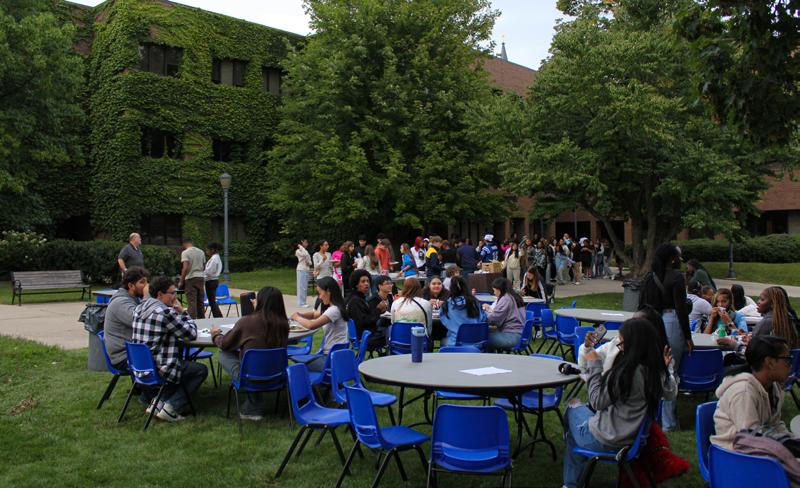
different activities, including arts and crafts and Nintendo Switch games. Outside, students were served tacos and ice cream and
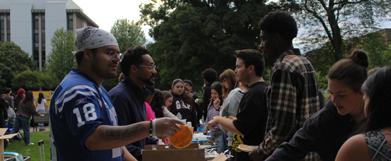
dedicated to first-year students, all grade levels were welcome. Campus organizations that aim to foster belonging, such as LASO, Marquette University Gospel Choir and Hmong Student Association, were also invited to table outside of Coughlin Hall to garner interest.
Rooms inside the building were sectioned off into
provided with tables to sit at.
The students behind the event were sophomores MaHailey Stephens and Natalie Rodriguez, who both attended Newbie Night Out when they were first-years themselves. Rodriguez, a student in the College of Business Administration, said she “saw the inclusivity and wanted to be a
part of it.” This year, both were asked to take leadership positions as the lead organizers for club events. Similarly, Stephens said that attending the event in her first year helped her build a community of her own.
“Marquette is a primarily white institution, but this shows everyone can be here,” Rodriguez said. She also said a foundational goal for Involved is making sure it’s open for everyone and not a closed club.
Alondra Cortina-Tamayo, a first-year student in the College of Nursing, felt that organizations such as Involved can provide new students an opportunity to build a network with students both in and out of their program of study.
Ashley Smith, a junior in the College of Arts & Sciences, was at the event representing Black Mindz, a student organization
aimed at providing nurturing and inclusive environments for Black students across campus. Smith said that continuing to hold events like this will help people find their niche on campus and allow them to find a community that feels like home. Rodriguez and Stephens similarly said that putting effort into meeting and working with new people helps develop leadership skills important to any facet of life.
According to Rodriguez,
more Involved events are in the works, potentially including another similar to the Winter Kickback that was held last March. Involved can be found on Instagram at @involved.mu and students are encouraged to join the GroupMe linked in their bio. Students interested in joining an on-campus organization should attend O-Fest on Sept. 4 to learn more about the clubs Marquette has to offer. Sept. 5 is the rain date for this event.
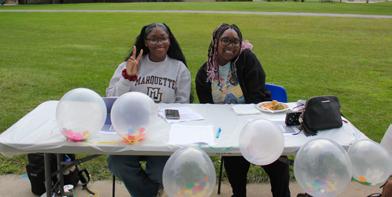
Heather Hathaway replaces Heidi Bostic
Former dean on sabbatical for an academic year
By Mia Thurow mia.thurow@marquette.edu
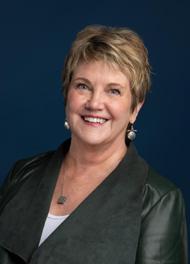
Heather Hathaway, English professor in the College of Arts & Sciences, has served as acting dean of the College of Arts & Sciences and College of Education since Aug. 1. She succeeds former Arts & Sciences Dean Heidi Bostic, who is taking a sabbatical for the upcoming academic year.
Acting Provost Sarah Feldner announced the position change in July.
“This is a challenging time in higher education, but I strongly believe in the value of Marquette’s Jesuit, liberal arts foundation,”
Hathaway said in a July university article. “I look forward to working closely with Arts & Sciences and Education faculty to continue to provide an out-
standing education to Marquette students.”
Hathaway was acting dean of the College of Arts & Sciences in 2019-20, associate dean for academic affairs in 2005-08 and 2017-19 and associate dean for faculty and graduate studies in 202021. Following her time in the dean’s office, she served on the University Promotion and Tenure committee, Faculty Hearing committee, Summer Faculty Fellowship Award committee and Raynor Scholarship Award committee.
Hathaway has a bachelor’s degree in English and American Studies from Wesleyan University in Middletown, Connecticut. She has a doctorate in the History of American
Civilization from Harvard University. Hathaway, who focuses on African American and Japanese American literature and culture research, has published two books, two scholarly collections and various articles.
She also received Marquette’s John P. Raynor Award for Teaching Excellence and the National Residence Hall Honorary Faculty Excellence Award. She was named Association of Marquette University Women Professor of the Humanities last spring. The change comes as Marquette is working to cut spending by $31 million by 2031. 15 programs are currently up for termination or modification. The
university hasn’t been able to disclose the list of programs; however, the Wire is aware of multiple programs in the College of Arts & Sciences.
“Dr. Hathaway has a stellar track record as a college leader in permanent and acting roles, and she has earned the respect of her peers and colleagues throughout the university,” Acting Provost Feldner said in July. “I have great confidence in her leading the colleges of Arts and Sciences and of Education through this transition. On behalf of the university community, I’d like to thank Dr. Bostic for her leadership and service to the university as dean for the past five years.”
A FINAL YEAR OF

'GRATITUDE'
Molly Keiper reminds herself to be grateful every game in her last season
By Mikey Severson michael.severson@marquette.edu
Molly Keiper summed up how she is approaching her final Marquette women’s soccer season with one word: gratitude.
It’s a word of so much importance to the graduate student defender that, before every game, she writes it on a piece of tape and wears it on her wrist.
“Just as a reminder to enjoy every moment, to be grateful for another opportunity to end it on a more positive note, doing the thing I love, at the place I love,” Keiper said.
After suffering a partial
tear of her posterolateral corner in her right knee in August 2024 during preseason training, the defender ended up having to miss the entire 2024 campaign due to the setback, but this challenge presented her with a unique opportunity to grow. Keiper, a Whitefish Bay, Wisconsin native, has been with Marquette since her sophomore year, starting in the 2022 season after spending her first year at Villanova. Head coach Chris Allen stated that her mentality and attitude never faded during the 2024 campaign, which was his first season at the helm, showcasing Keiper’s resilience through
adversity and being a source of positivity for the team, despite the challenging circumstances.
“I think that she brings the word ‘uncompromising’ to life; she walks in a room and the energy changes immediately,” Allen said.
She resumed practicing at full speed in February, albeit with a brace on her right leg for spring games.
As part of the team’s foreign tour in Italy, Keiper played her first competitive game since the injury, which was something the team rallied behind.
“We were talking about it, leading up to the tour, how special it was, her parents
MEN'S SOCCER
came out to Italy to see her first game back,” graduate student forward Aislinn Boyle said. “It was great; you would never know that she had a serious injury, which is something that people worry about a lot when having that experience, is people having to tell that you went through that, but you couldn’t tell at all.”
Keiper grew up going to Marquette women’s soccer matches as a kid, specifically Marquette versus UW-Milwaukee games.
She played her high school soccer at Whitefish Bay High School, which is roughly three miles from
HOF exit
Former WSOC coach
"elects not to
participate"
By Jack Albright jack.albright@marquette.edu
The 2025 M Club Hall of Fame class started with eight inductees on Aug. 20. Less than one week later, it dropped to seven as former Marquette women’s soccer head coach Markus Roeders was removed from |the class.
Marquette athletics told the Marquette Wire in an email Roeders “elected not to participate in the Hall of Fame process” after the announcement was made.
“Marquette athletics respects his decision and thanks him for his years of service to the program,” a department spokesperson wrote.
The Wire called the phone number listed for Roeders, but received no response and left a message.
It’s unclear when Roeders was removed; the Wire noticed his updated omission from the press release on Aug. 25.
Roeders was hired by Marquette in 1996. He spent 24 years as head coach of the women’s soccer team before stepping down from the program in 2019.
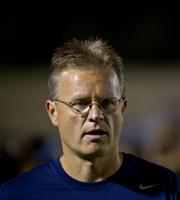
MU players stay fit in semi-pro summer league
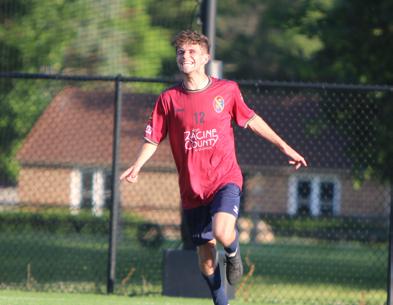
Over 10 Golden Eagles played for USL-2 teams
By Sofie Hanrahan sofia.hanrahan@marquette.edu
Preseason, fall play, spring training, repeat. During the school year, there are no days off for a Marquette men’s soccer player.
Then what about the summer?
With Marquette’s program only having a twoweek preseason beginning
"They have to come back as ready as they can, and be as physically sharp as they can."
David Korn Marquette men's soccer head coach in early August, players must utilize the majori-
ty of the summer break to stay conditioned.
“They have to come back as ready as they can, and be as physically sharp as they can,” head coach David Korn said. “There’s also a balance that they’re refreshed energy wise, because it’s a long fall.”
Since most college players have aged out of eligibility for youth clubs, they target summer leagues as the chosen method for staying fit.
Enter the USL-2: ‘the leader of pre-professional
See FIT page 8
Tuesday, sepTember 2, 2025
Natalie Ring shines in Marquette's 2-1 start
Outside hitter posted 79 kills in three matches
By Matthew Baltz matthew.baltz@marquette.edu
Last fall, it took Marquette volleyball 14 days to hit 15 sets played. This season? Only three. Over the weekend, the Golden Eagles opened the Tom Mendoza era in Honolulu, Hawaii for the 2025 Hawaiian Airlines Wahine Volleyball Classic. MU will travel back to Milwaukee 2-1 after a successful opening weekend of games and historic 79-kill weekend for senior outside hitter Natalie Ring.
Here’s how it all went down in The Aloha State: Ring explodes for 27 kills in reverse sweep of Hawai'i
Lose the first two sets, win the next three. The Golden Eagles won the first game of the Tom Mendoza era just the way he drew it up.
After dropping the first two sets 25-27 and 17-25, MU had to dig deep in a third set that lasted 66 total points and took every ounce of effort from the Golden Eagles to fight back and avoid being swept.
After going back and forth for nearly 20 points, MU found itself down 3231. But then Ring took over, firing home a kill to even things up at 32 and rising up for a solo block to give Marquette set point at 33-32. Graduate middle blocker Hattie Bray sealed the deal with a kill off a pass from first-year setter Isabela Haggard to give the Golden Eagles the 34-32
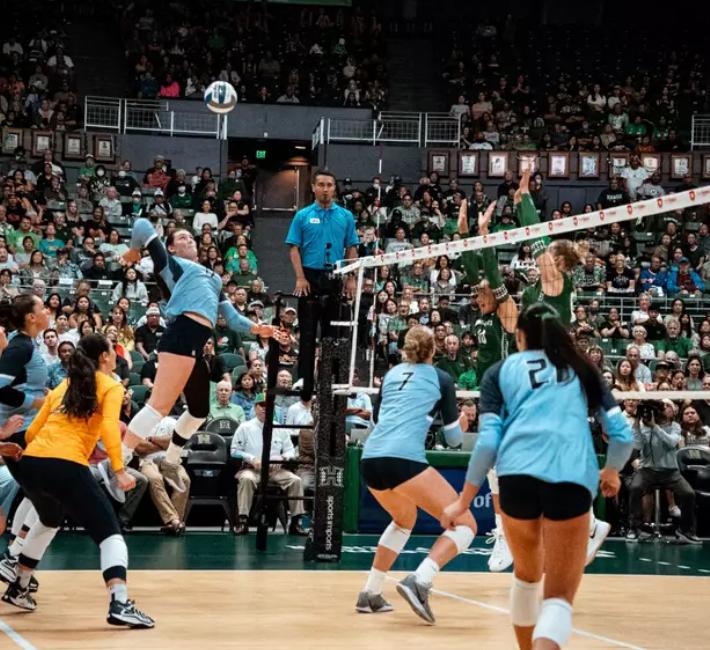
Ring started MU's season with a career-high 27 kills. Two days later, she set a new best of 28 kills. set win.
From there, Mendoza’s squad rode the momentum of its set three triumph, winning set four convincingly 25-18 and closing the match out with a 6-0 run to win the fifth and final frame 15-9.
Ring finished the opening night with a then-careerhigh 27 kills on 80 attempts, good for a .213 hitting percentage. A pair of first-year players showed out in their Marquette debuts, as middle blocker Keira Schmidt hit .692 with nine kills on 13 attacks while Haggard dished out 49 assists.
Marquette fumbles away late lead to
lose in five sets against San Diego
Despite losing set one 21-25, the Golden Eagles grabbed their first set win of the night in the second frame 25-23 and then dominated the third set 25-15 to go up 2-1 on the Toreros.
After trailing for most set four en route to a 20-25 loss, MU was once again headed to a deciding fifth set.
After 17 points had gone by Marquette led 11-6, just four points away from their second win of the season. But an attack error from Ring made it 11-7 and a service ace from sophomore setter Kylie Munday trimmed MU’s lead to
WOMEN'S SOCCER
just three.
From there, San Diego kept scoring to reduce the Golden Eagles’ lead to one point, and then sophomore outside hitter Isabel Clark sent a kill to the floor to knot the score up at 12. Clark would go on to kill two other points and come down with a half-block on an attack from Bray, sealing the deal on a five-set victory for the Toreros, 1513.
After never having a 20kill performance in her entire career, Ring notched north of 20 kills for the second match in a row, finishing with a team-high 24. Two other Golden Eagles reached double digit kills,
with senior outside hitter Ella Holmstrom finishing with 14 and Santa Clara transfer hitter Elena Radeff finishing with 13.
Utah State’s comeback attempt falls short as the Golden Eagles improve to 2-1
In near identical fashion to the way Saturday night’s game got to five sets, Marquette blew a 2-1 set lead to send the match to a winner-take-all fifth frame Sunday afternoon.
Ring had worked too hard all weekend to let the Golden Eagles fly out of Hawaii with a losing record, so what did she do? Put on another historic performance. After killing Marquette’s first three points of the match to tie it up at three, Ring was up to 24 kills.
Then came No. 25 to make it 13-11 MU. No. 26 came to tie the frame up at 15, sending it to extra points. Kill No. 27 evened the set up at 16 just two points later, and kill No. 28 not only helped her set a new-career-high, but it also gave Marquette an 18-17 lead.
But the biggest play of the night for Ring didn’t come in kill form, it came when she teamed up with her fellow All-Big East preseason selection Bray to send sophomore hitter Loryn Helgesen’s attack to the floor, giving the Golden Eagles the set and match, 20-18.
Bray and Ring teamed up for a combined 47 kills against the Aggies, with Bray hitting an otherworldly .679 on 28 attempts.
MU opens a 13-game homestand on Friday against Western Kentucky at 7 p.m. CST.
YEAR: Defender missed all of 2024 with injury
Continued from page 5 the University of Wisconsin-Milwaukee’s Engelmann Stadium. When the Golden Eagles traveled across town to face the Panthers on Aug. 21, senior Josie Bieda’s fast break towards the Panthers’ goal led to a free kick opportunity for the Golden Eagles, with Keiper being the one to take the shot.
She found the upper left corner of the net, above a diving Lilly Hanke in net for the Panthers. It was the only goal of the match for either side. While it felt full-circle to Keiper, she said that the support of her teammates helped sweeten the moment.
“It’s everybody around
"Just a reminder to enjoy every moment..."
Molly Keiper Marquette women's soccer defender
you, they feel like they’re the one scoring the goal because how excited they are for you and take the step up for the team,” Keiper said. “I wouldn’t have had that opportunity to score that goal without Josie Bieda drawing that foul, then she’s the first one to give me the biggest hug, picks me up off the ground to
celebrate.”
As a 10-year-old, Keiper received a signed poster of Marquette women’s soccer that she hung above her bed, which her parents still have. Now, she’s the one signing them with ‘gratitude.’
“So that full circle moment of when I was the little girl, those college players were the people I had dreamed to be, and I thought they were the coolest people in the world,” Keiper said. “I thought they were celebrities; then now to be the one that’s on the other end of that is a really cool feeling, and another thing that I have incredible gratitude to have this opportunity to do.”
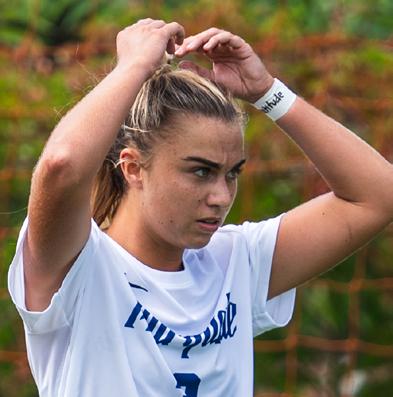
Club tennis 'excited' to play in new rec center
Team is practicing on campus again after two years
By Ben Ward benjamin.ward@marquette.edu
Instead of traveling to Glendale just to practice, the Marquette club tennis team is ready to serve up a significantly improved set-up.
A 15-minute drive has become a short walk for the club tennis players with the opening of the newly renovated Wellness + Helfaer Recreation Center
on campus.
It means the club no longer needs to trek to the Northshore Elite Sports Club, where it practiced for two years starting in spring 2023, giving the team more court time, additional practices and heightened expectations.
“I think it will totally be to our advantage,” said senior Claire Converse, who also serves as the team’s president. “People are already getting excited.”
One thing they’re especially excited about is the high player retention rate now that they’re back on campus.
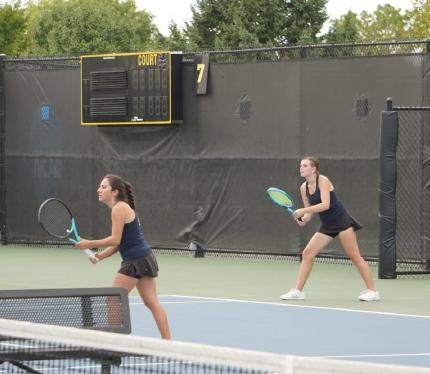
With an estimated 50-60 returners, Converse said the team is excited to make a statement with their experienced senior class and promising new talent who have been competing at a high level.
“We are thinking tryouts might be more competitive this year,” Converse said.
Those tryouts are for the club’s national team, which competes against other universities in hopes of qualifying for nationals. It’s something the club has unsuccessfully tried to do before, getting close but falling just short in years past.
"I think it will totally be to our advantage."
Claire Converse Marquette club tennis presdient
Now, with their experience and the new practice environment, they’re aiming to break that pattern.
“We’ve known that’s the strategy for a couple of years,” said Converse. “Now we have good retention with our
CROSS COUNTRY
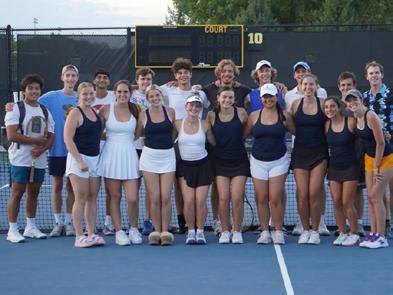
seniors… our class has been really strong.”
But the team cares about more than just wins and losses — there’s a community aspect to joining as well, something Converse has emphasized the new rec center will help accomplish this year.
“People found their roommates and best friends,” Converse said.
“People have come out of their shell.”
In what is normally an individual sport, Converse said she appreciates how the club makes tennis team-oriented, allowing players to cheer for their teammates during matches, as everyone is watching on the court.
“All the grades go together,” said Sophia Esquivel, a senior in the College of Health Sciences.
Having that support system from other club members helped Esquivel improve in her four years on the team.
“My doubles game has gotten way better,” she said.
Converse wants to keep building the club by having as many people as possible attend tryouts Sept. 8-10 at the rec center.
“It is truly a great blend of (a) competitive and recreational (environment),” Converse said.
Hackett setting the bar 'higher and higher'
MU cross country head coach enters second season
By Conor McPherson conor.mcpherson@marquette.edu
With a new coach in charge of new runners, Marquette cross country’s 2024 season was as transitional as one maybe can be.
It was Jack Hackett’s first year in charge, and along with the challenges that building a program bring, he was coaching a young team after six seniors left.
“It ended up being five freshman eligible runners on the men’s side that made our regionals roster,” Hackett said.
It led to some lackluster results in the team’s biggest meets — the Big East Championships and NCAA Regionals — with the men’s team finishing in last place in both, and the women, who were second to last in the conference tournament and 32nd (out of 39th) at regionals.
Now, though, with a year under both the head coach’s and student-athletes’ belts, Hackett is look-
ing to mold a winning culture upon which to build.
“The bar is just being set higher and higher, because we have really talented kids that want to come to Marquette and compete,” Hackett said. “It’s a huge privilege to be here, and we want our athletes to respect that and to live up to their end of the bargain.”
Although the teams were regular backmarkers throughout 2024, Hackett said there were many student-athletes he’s expecting improvements from this year.
“There’s been a good culture set by those leaders like Logan [Goodman], Emma [Coon] and Sean Kellogg,” Goodman said.
Junior Logan Goodman ran in five meets for the Golden Eagles last season and set personal records in both the 8-kilometer and 10-kilometer with 25:28 and 33:05 respectively.
With the emergence of sophomore Edgar Valles, who ran in six meets last season as a first-year, Goodman has noticed the team developing quickly by running together in a pack more consistently.
On the women’s team, ju-
nior Emma Coon paced the women’s side in every race last fall and looks to once again be their top runner this season.
“The whole team is working together in this pack,” Goodman said. “You know, it’s just like the team itself has, really elevated a lot, it’s really exciting.”
Goodman said he has noticed that many of the student-athletes on the team have been more active in their workouts this year compared with last year.
“The difference between the team this year and last year, it’s just night and day,” Goodman said.
Hackett believes the entire team sticking together this early in the season, will pay dividends later on in the year.
Goodman, whom Hackett identified as one of the leaders on the team, is much more focused on individual and team growth over worrying about the opposition.
“I feel like I just have to beat me, and we just have to beat us,” Goodman said.
Beyond Goodman and the team’s top runners, Hackett said his priority is seeing growth and progress across
the entire roster.
“The depth and the ability to pack run is going to be the difference this year more than last year,” Hackett said.
With the rebuild in progress, Hackett expects a lot of headway made in the field, as well as in the classroom.
“I want people to recognize how much work and sacrifice these athletes are putting in, and I think we’ll see that in the results,
hopefully both in the classroom and out on the field,” Hackett said.
Hackett is one year into a full rebirth of Marquette cross country, aiming to revitalize the program from the inside out.
The Golden Eagles have four regular season meets, all on the road. Postseason begins with the Big East Championships on October 31, followed by the NCAA Great Lakes Regionals in Evansville, Indiana.
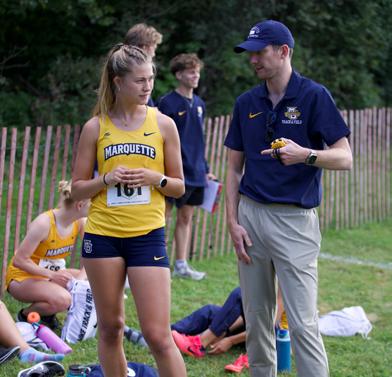
FIT: Five players joined RKC Third Coast
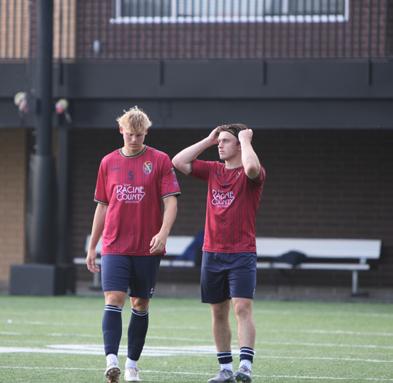
Continued from page 5
soccer in North America.’
In Arizona, graduate midfielder Justin Milovanov won most valuable player award for FC Tucson. While in Illinois, Antonio Costabile made the Central Conference Team of the Year for his team Sueno FC.
The majority of the squad joined RKC Third Coast: sophomore defender Jack Wandschneider and midfielder Hudson Torrez, junior defender Ryan Amond and midfielder Nico Pendleton and senior midfielder Gabe Anguil.
With all but one of the five being Wisconsin natives, it made the Third Coast’s Racine location ideal.
Wandschneider rose from the Academy to the first team this summer, starting in seven games. Anguil was connected from Marquette’s former coach Sean Hughes. After taking a year off, he returned this summer.
“It was as great as I remembered,” Anguil said. “A lot of good guys on the team, traveling with them and creating new friendships for the summer.”
USL-2 draws many high-level players, especially D1 athletes, to keep themselves conditioned.
and living a normal life. Players can stay in shape, but still enjoy the game. In some ways, it’s the best of both worlds.
“I think it’s very important to play summer league,” Anguil said. “It’s definitely more relaxed and you can enjoy it a little bit more.”
On July 13, RKC played its final match of the season and ended in a 3-1 victory.
A little over a month later, on Aug. 21st, Marquette made its season debut.
That may seem like a quick turnaround from burgundy to blue and gold, but it’s all part of the game.
Over 10 Golden Eagles played in the league all over the country this summer.
In the U.S. soccer pyramid, USL-2 sits below MLS or USL-1 and USL Championship, since they are not considered professional, but above the NCAA.
“Guys can live on campus, they can use our weight room, they can be around friends and family or stay in an apartment,” Korn said. “But then they’re playing with high-level players, so those kind of opportunities and partnerships are really important.”
MEN'S SOCCER
RKC showcased players from other schools like Creighton, UW-Milwaukee and Northwestern.
The team finished third in the Heartland division, with only a four-point differential from the teams tied for first.
More than anything, the draw to a summer league like USL-2 is the opportunity to balance the sport
“Summer’s a time where people relax, and as an athlete, it’s not how it works for us,” Wandschneider said. “It’s kind of a full time job.”
Well, this rep of the job is back in office for the fall, clocked in and ready for business.
Three-first time goal scorers give MU win
By Sofie Hanrahan sofia.hanrahan@marquette.edu
Mitchell Dryden wasn’t vying for an equalizer like he was three days prior against Drake: this time he was igniting the fire.
Sophmore midfielder Grant Locker sent the ball up to the senior forward in the seventh minute, who launched it off his right foot into the lower right corner — nothing but net.
This was just the beginning of the momentum that would empower Marquette men’s soccer (2-0-2) to barrel past Chicago State (0-40) 4-0 for its second victory on home turf.
“Pleased to get a win,” Marquette head coach David Korn said. “We thought
it was going to be important to score early, doesn’t mean that always happens, so to get an early goal was great.”
In the 30th minute, junior midfielder Nico Pendleton subbed on. A minute later, he scored his first goal of the season off a rocket from the top of the box.
Pendleton found himself as a playmaker yet again, just 10 minutes later, when first-year defender Joey Buchanan headed Pendleton’s corner into the back of the net for his first-career goal.
“Coach always stresses the importance of putting it in dangerous areas in the box, so I did that and left the rest up to the teammates,” Pendleton said. “Joey works hard so he deserves it more than anyone else.”
The colossal first half performance may make the more subdued play in the second 45 seem lulling, but
Mitchell Dryden
MSOC No. 15
Mitchell Dryden scored twice for Marquette men's soccer last week. The senior forward scored once in each of the Golden Eagles' wins, also posting a season-high in minutes against North Florida.
Isabela Haggard
MUVB No. 3

First-year setter Isabela Haggard made her Marquette debut last weekend. The Lexington, Ky native started every game for the Golden Eagles, and posted three double-doubles.
the Golden Eagles stayed composed until the clock showed 90 minutes.
"Joey works hard so he deserves it more than anyone else."
Nico Pendleton
Marquette
men's soccer junior midfielder
“In the first half, some of their best chances came from our mistakes, and they pressed with great intensity,” Korn said. “We talked about how we could manage that coming out of halftime.”
The cherry on top was sophomore forward
Hudson Torrez’s goal in the 76th minute, which made him the third player to record a first goal of the season in the match. Korn noted the difficulty of choosing which player to fill each position, but today demonstrated that’s not al-
ways a bad thing. “A lot of guys came in and had different debuts, played more minutes for us,” Korn said. “It’s been a good competition and really fun to see the guys get rewarded with some goals and a clean sheet.”
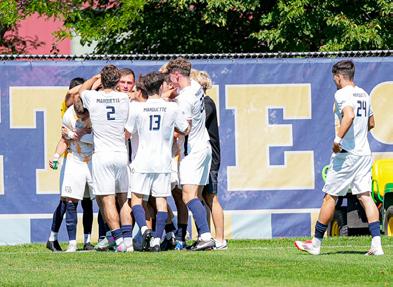
Opinions
Make gun-free college campuses state law
Guns have no place on college and university campuses. Wisconsin needs to make changes if it wants the safety of students to remain a top priority.
Wisconsin Democrats announced new gun legislation to amend state law on Aug. 27. It came the same day as the Annunciation Catholic Church shooting in Minnesota where two children died, and 14 other children and three parishioners were injured. The revision prohibits the concealed carry of firearms on college and university campuses in the state. It would make on-campus gun possession a misdemeanor with up to nine months in jail and a fine of up to $10,000.
Currently, 11 states allow concealed carry, including Wisconsin. The effort to pass the bill has faced many setbacks. It has been introduced in previous sessions, but Republicans have repeatedly blocked it because, according to Wisconsin’s top Republican lawmaker Robin Vos, passing more restrictions is an overreach by Democrats that does not solve the problem.
After Republicans stripped gun safety measures from the budget, Democrats attempted to reintroduce them in June as separate bills but failed.
Senator LaTonya Johnson, D-Milwaukee, wanted her Republican colleagues to pass at least some of the bills to public hearings.
“Year after year, I’ve watched Republicans cut every single gun safety proposal from the state budget,” Johnson said.
“And year after year, we see more victims and families burying their babies.”
Guns are not the solution when it comes to safety, and students should not have to live in fear at their place of learning. According to a 2021 campus safety survey conducted across the U.S., 82% of college students are concerned about their personal safety, and 97% consider their personal safety while on campus.
Marquette has a no weapons allowed policy that prohibits firearms, knives, explosives, etc. in campus buildings or residence halls. It is one of the many universities that has its own weapons policy, but passing this bill would set
a state-wide standard.
This generation of college students grew up practicing active shooter lockdown drills at school, and it is horrendous and deeply saddening that primary and secondary schools will have to continue them, unless changes are made.
The tragic incident at the University of Wisconsin-Platteville back in May 2025 is another testament to the importance and severity of this issue. Two UW-Platteville students were killed in what was ruled a murder-suicide.
Kelsie Martin died from a gunshot wound, and Hallie Helms died from a self-inflicted gunshot wound.
The shockingness of this event demonstrates the unpredictability that comes with gun possession, whether it is premeditated or accidental. The outcome will result in severe emotional turmoil and possible losses.
This year, there have been 44 school shootings in the United States, with half of them occurring on college campuses.
While the ability to carry a concealed weapon is seen by many as a fundamental
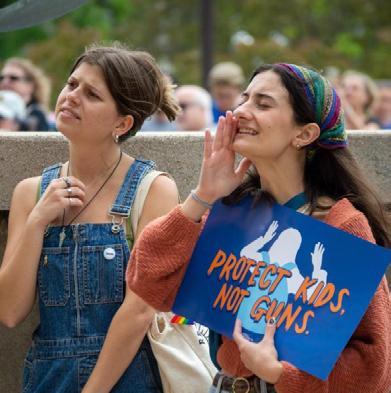
right and a form of self-defense, it has contributed to an increase in gun-related crime. States with permissive concealed carry laws, like Wisconsin, have higher rates of gun homicides and violent crime. The idea that concealed carry increases public safety is illogical because there is no evidence suggesting that it reduces violence.
Ensuring safety within
education is a necessity, and gun prohibition is a major step closer to achieving it. School campuses should be a safe place for growth and development, free from gun violence. Keep campuses safe, pass the bill.
MKE festivals must promote belonging
For nearly a century, Milwaukee has been known as the “City of Festivals,” holding nearly 150 festivals year-round.
Milwaukee’s city-wide celebrations are recognized for uniting people under one purpose: to honor all members of our community. By dedicating weekends to making minority groups in Milwaukee feel seen and heard, these festivals are integral events in building a sense of belonging in our home.
As Milwaukee grows as a city, ethnic groups will continue expanding, building an even richer city identity. In today’s age, social media’s ability to rapidly connect people has made these festivals easily accessible.
Without a doubt, Milwaukee’s largest festival is Summerfest, with over 600,000 attendees this past summer. Running for over fifty years, Summerfest has become a diverse hub of live music each year, offering musical artists from countless genres, from Afrobeats to K-pop.
Each ethnic group has been present in Milwaukee for decades, yet Summerfest’s inclusivity has only taken place in recent years;
as the festival was originally intended to showcase German culture. By making Summerfest a unifying event for all communities in Milwaukee, this makes Milwaukee’s community aware and proud of being a part of such a diverse city. Besides the diverse lineup of artists, Summerfest’s “Latin Music Day” is an entire day dedicated to celebrating Latin music. By recognizing the Latin community in Summerfest’s rich lineup, people feel represented because there is something for everyone. Mainstream or underground, music is used as a powerful tool to bring people together because of the stories it tells.
Although each festival in Milwaukee has a fanbase, some groups have experienced political conflicts that have resulted in difficulties in sponsoring pride festivals that are significant in embracing their identities. The LGBTQ+ community has faced challenges from Washington D.C. this year that invalidate its presence as a minority, such as anti-DEI legislation, and many threatening policies against the existence of LGBTQ+ people. For pride festivals na-
tionwide, these challenges have led to difficulty in retaining sponsors, as many corporate companies have rescinded their donations towards other cities’ festivals. For cities like St. Louis and Minnesota’s Twin Cities, this meant that they lost thousands of dollars in sponsorship. Fortunately, Milwaukee’s sponsors have remained supportive of PrideFest and have resisted anti-DEI legislation. LGBTQ+ youth have already faced higher rates of housing insecurity and mental illness compared to non-LGBTQ+ youth. It is essential that PrideFest continues to obtain its sponsors, as the festival increases LGBTQ+ visibility in Milwaukee. This year, PrideFest reached record-breaking attendance, with 46,168 visitors. With all challenges considered, this crucial support validates the identities of LGBTQ+ members. Cultural festivals play a significant role in giving back to their communities. For Mexican Fiesta, Hispanic food, dance and history are key elements of this high-energy festival in late August. The Wisconsin Hispanic Scholarship Foundation sponsors Mex-
ican Fiesta, which fundraises a great amount of the proceeds for local Hispanic students pursuing higher education.
Milwaukee has also added new festivals. “Celebrating Palestine” made its debut at the Marcus Performing Arts Center this year, showcasing Palestinian art, food and heritage to almost 2,000 attendees. Considering the Israeli-Palestine war that has continued for decades, holding events such as “Celebrating Palestine” is crucial in ensuring that its population does not feel isolated but rather empowered as an ethnic group in Milwaukee. These are only a handful of cultural festivals that take place each year; however, each one returns to the idea of featuring the unique aspects of a given culture. Events such as the Third Ward Art Festival and Labor Fest that were held Aug. 30-Sept. 1 recognized the working class and many small businesses that are the backbone of Milwaukee.
Statement of Opinion Policy
The opinions expressed on the Opinions page reflect the opinions of the Opinions staff. The editorials do not represent the opinions of Marquette University nor its administrators, but those of the editorial board.
The Marquette Tribune prints guest submissions at its discretion. The Tribune strives to give all sides of an issue an equal voice over the course of a reasonable time period. An author’s contribution will not be published more than once in a fourweek period. Submissions with obvious relevance to the Marquette community will be given priority consideration.
Full Opinions submissions should be limited to 600 words. Letters to the editor should be between 150 to 300 words. The Tribune reserves the right to edit submissions for length and content.
Please e-mail submissions to: rachel.lopera@marquette. edu. If you are a current student, include the college in which you are enrolled and your year in school. If not, please note any affliations to Marquette or your current city of residence.

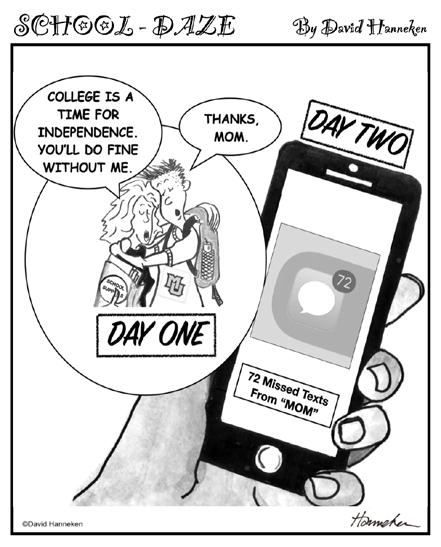


Submit finished puzzles to sophia.tiedge@marquette.edu by December 15. Most accurate crossword submissions wins a grand prize.
Arts & Entertainment
MU Theatre to work with Milwaukee actors
The group's first performance will premiere Oct. 3
By Allison Scherquist allison.scherquist@marquette.edu
Marquette Theatre’s new season of performances will begin with the premiere of “Fiddler on the Roof” on Oct.3 at the Cabot Theatre in the Broadway Theatre Center on 158 N Broadway Street.
It will be the debut performance of Marquette Theatre’s “Viewpoints” season — a collection of three shows, each exploring different perspectives of human interaction. The production will be presented in collaboration with Skylight Music Theatre, one of Milwaukee’s leading professional theaters.
The decision to collaborate with Skylight Music Theatre was made to give Marquette students the opportunity to work alongside professional actors and directors. Auditions took place last April, and since then, Marquette students have been gaining hands-on experience in the theatre environment.
Ben Shields, a junior in the College of Communication who plays Perchik in "Fiddler on the Roof,” finds the experience both exciting and rewarding.
“Skylight has been a joy to work with thus far. We have a fantastic group of professionals we have been working with for the dance workshops,” Shields said. “I truly believe all of us will get many opportunities to learn and evolve with this experience.”
Skylight Music Theatre Director Michael Unger said he wants to treat students as equal partners, aiming to emphasize the authenticity in their performance.
“The audition was really beautiful because they’re all close friends,” Unger said. “Seeing these young performers live through the characters’ experiences brings an authenticity you don’t see everywhere. They’re not acting—they’re playing themselves.”
A frequent playgoer, Unger has attended and directed hundreds of performances, including previous Marquette Theatre productions. Impressed by the talent he saw, he began casting Marquette students
in Skylight productions in previous years. After that, he began collaborating with Marquette Theatre Arts professor and Artistic Director Jamie Cheatham to cast “Fiddler on the Roof,” noting the advantage of Marquette students’ age range.
Kynkade McLachlan, a senior in the College of Communication, plays Hodel. She said being part of the production has given her the chance to learn from experienced professionals and grow as a performer.
“We have the exciting opportunity to learn from and grow with these individuals and tell a story that will move audiences just as it does us,” McLachlan said. “It’s my first time performing in front of thousands of people. Although nerve-wracking, I am eager to hopefully make a positive impact on someone’s life.”
“Fiddler on the Roof” tells the story of a 20th-century Jewish milkman who struggles to uphold his cultural traditions as he navigates poverty and hate in czarist Russia. The show explores themes of change, family and discrimination. As the milkman attempts to
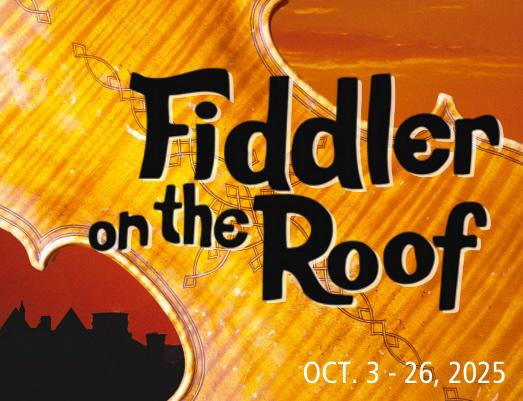
marry off his daughters and maintain his family traditions, he’s confronted by the harsh reality of the changing world and the rise of antisemitism. The production brings these themes to life through the cast’s performances and its music. The musical will feature two violins from Violins of Hope, an organization that restores and shares instruments that survived the Holocaust. The violins, played by Jewish prisoners in concentration camps during World War II, will be used in the show as part of a Milwaukee residency
through the Milwaukee Symphony Orchestra. McLachlan and her castmates hope that audiences will recognize the parallels between the struggles shown on stage and the injustices still happening today.
“We want to make it very clear that theatre and art in general are inherently political,” said MacLachlan. “[Fiddler on the Roof] explores many themes that remain incredibly relevant today, and they will not go unnoticed.”
Shows run Oct. 3 – 23.
MUPS share plans for 2025-26 school year
Club members work to welcome new students
By MaryKate Stepchuk marykate.stepchuk@marquette.edu
On Friday, Aug. 29, the Marquette University Players Society (MUPS) hosted its annual picnic at the Helfaer Theatre to welcome aspiring new members and first-year students into its organization.
MUPS is a student-run theatre organization known for putting on shows outside of the traditional Marquette Theatre productions. They aim for four productions a
year, all free to the public.
The picnic provides an opportunity for students— mainly first-years— to meet new people, ask questions and learn more about Marquette’s only student-run theatre organization.
In the organization, students express their creativity through producing shows, writing new shows or creating new twists on classic shows. The creative liberty MUPS offers makes the organization highly appealing to students of all majors.
While most of the 50 students in the organization are theatre arts majors/minors, MUPS welcomes students of
all degrees, hoping to attract people from all disciplines and colleges.
They encourage people to step outside of their comfort zone. Whether a person wants to direct, stage manage or act, the members of MUPS are determined to find a place where anyone can thrive.
Although the picnic was moved inside due to the rain, current members were eager to share their love and commitment to the organization. There was no shortage of passion for the upcoming year’s plans and projects.
MUPS provides more opportunities for first-years
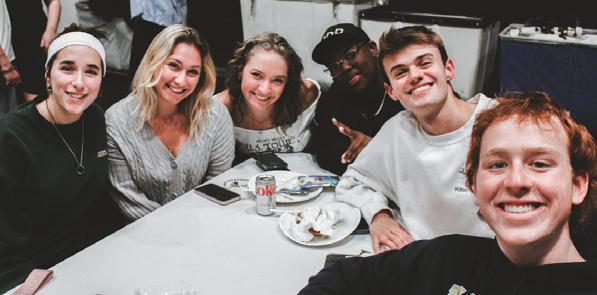
and underclassmen to perform outside of Marquette Theatre. Mia Mannella, a sophomore in the College of Communication, shared how MUPS creates a positive environment for the organization.
“There were so many people I could just go and talk to, especially as a first-year,” Mannella said. “I’m excited because I know that is going to carry through this year, as well.”
In MUPS, the upperclassmen tend to take on significant leadership roles in directing, managing, acting and guiding the overall organization.
These leadership positions create a path for role models, Mannella added.
As an upperclassman, Erin Cavender, a senior in the College of Communication, expressed her excitement about becoming one of those role models herself.
“Throughout my time here at Marquette, I have definitely grown, not only as an actress, but also as a person,” Cavender said. “I have grown to become a face that people know and recognize, so I want people to come to me if they need advice or need a friendly face.”
This welcoming, friendly environment that Manella
and Cavender mentioned above has allowed MUPS to put on elaborate student productions in the past, including a Fall Cabaret, “Dracula (The Radio Play)” and their most popular production from last year, “Horse Girls.”
Student-run productions require an extra level of passion and dedication, as they are time-consuming on top of a normal student workload. Many of the actors and actresses rehearse for Marquette Theatre shows simultaneously, making the task even more difficult.
This year, the actors/actresses are eager to give MUPS more attention, as Marquette Theatre is only producing three shows, compared to the typical four. Draylin Pickett, a junior in the College of Communication, touched on the organization’s upcoming plans for the year.
“There are rumors of a musical happening, so hopefully we can get that off the ground,” Pickett said. “MUPS has never done a full-blown musical before, so even though it is not set in stone, we are going to try.” To learn more about MUPS, visit their website and Instagram.
Blue Star Café: An East Side Somali staple
been serving hearty, affordable dishes since 2012.
By Joseph Schamber joseph.schamber@marquette.edu
It’s a wonderfully simple restaurant with a straightforward, well-organized menu that contains only a few offerings. When I go, I
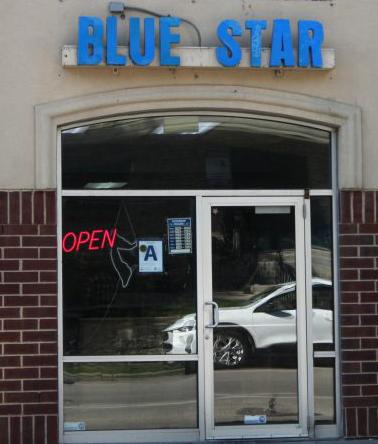
Nestled in Milwaukee’s Lower East Side, alongside heavy hitters like the Diplomat and Sanford, is another culinary institution that you probably haven’t heard of if you are not from the area.
Blue Star Café is a family-owned Somali restaurant just off Brady Street that’s
frequently see regulars walk to the kitchen, cracking open the door labeled “employees only” to greet the owners, Abdirizak Aden and Alia Muhyadin. Diners eat off paper plates or occasionally, large aluminum platters. If they aren’t using plastic cutlery,

Sept. 2
FBI Focus Program
Details: - 5-8 p.m. - Olin 202 Craft Open Workshops
Details: - 6-9 p.m. - Grey House Studio
they scoop handfuls of rice and meat with their right hand, as is tradition in Somali dining.
Somali cuisine, while less popular in Milwaukee than other global cuisines, might deserve more recognition.
Somalia’s position near the Arabian Peninsula gives the cuisine a Middle Eastern character, and due to its history of commerce with India, it also shares some similar spices and cooking techniques. Xawaash, which is the foundational blend of spices in Somali cooking, closely resembles Indian garaam masala.
Additionally, due to colonization, they also borrow from Italian cuisine. They serve spaghetti with suugo suqaar, accompanied with a side of sliced banana, which came from the plantations set up by the Italian occupants.
The flavors that result from this blend of cultures feels oddly familiar and can impress even the least adventurous palates.
Blue Star Café captures what makes Somali food so special all while being a casual, affordable place to eat. It’s one of my favorite restaurants here.
My first run-in with Blue Star was last year, when another cook at the restaurant I work at introduced me to it. Based on his recommendation, I ordered the tender goat platter for $14.99 and a beef sambusa, which was just $1.99.
The goat was supremely tender, and the flavor was incredibly complex, accented with a myriad of spices that, besides the sweetness of the cinnamon, I could not quite pick out. It was also served with bright orange pieces of onion, soft and fluffy cubes of potatoes and raisins.
And before you go ordering the platter without the raisins, give them a chance. They provide the perfect pop of sweetness that stands up to the savory components on your plate.

The chicken suqaar is another standout protein option. The bite-sized pieces of chicken are marinated in cumin, coriander, turmeric, paprika and other spices, and are served atop your choice of basmati rice, pasta, salad, veggies or kay-kay, which are slices of flatbread soaked in lamb stock.
Basmati rice is my go-to but that kay-kay, soft, flakey and fully saturated with that savory stock, is another a great option and worth the extra money to add on.
The sambusas are equally delicious. Sambusas are flaky pockets of pastry dough stuffed with boldly spiced ground meat, just like Indian samosas. Dipped in yogurt and their spicy, herbaceous green sauce, they make for the perfect treat on the side of your
meal and only cost $2.
Other highlights include their sandwiches, served on plush hoagie rolls with lettuce and a creamy sauce. I prefer one with the Somali steak, and at $6.99 a sandwich, it is well worth trying out.
Blue Star Café is serving some of the most uniquely flavorful dishes in the city at an extremely reasonable price point. I recommend adding it as a stop on your next trip to Brady Street or as an occasion all on its own.
You can find the restaurant at 1619 N Farwell Ave. If you stop by, you need to try out the tender goat, as there are few things in Milwaukee that taste that good and cost that little.
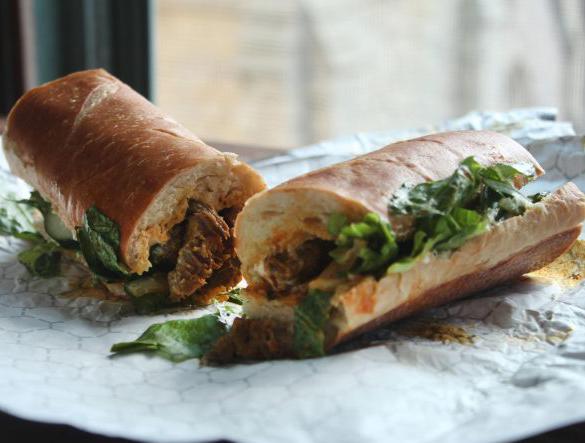
Sept. 3
Study Abroad Fair
Details: - 10 a.m. - 1:30 p.m. - AMU 2nd Floor
Mass of Holy
Details: - 5-11 p.m. - Village of Wauwatosa Weekend
Ikea Frank Mots Int'l Kite Festival
Details: - 10 a.m. - 5 p.m. - Sept. 6 & 7 - Veterans Park
West Allis Farmers Market
Details: - 12-5 p.m. - Saturday Sept. 6 - 6501 W. National Ave
